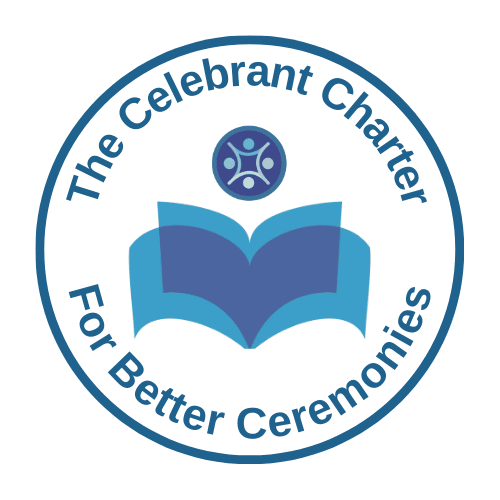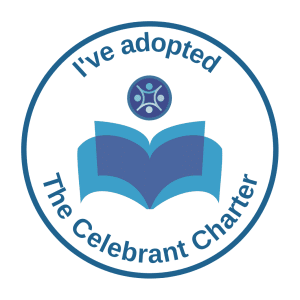
The Celebrant Charter defines the attributes and skills required of an excellent celebrant and is intended to set the standards by which all celebrants offering ceremonial services should be measured.
The role of a celebrant is to serve their clients, clients families and their community by creating and leading personal, accurate and respectful ceremonies.
Their work should clearly reflect the life, values and beliefs of their clients, acknowledge and give time to their community of family and friends, and create an environment in which the ceremonial process can be held and supported.
There are two fundamental types of celebrant, which are Funeral and Wedding / Family Celebrants. Celebrants can be either or both types of celebrant. We have produced a charter for both types of celebrant.
Funeral Celebrant Charter
This agreement outlines the most important expectations of an outstanding funeral celebrant and is intended to act as a benchmark by which all funeral celebrants can be measured. In adopting this charter a funeral celebrant is committing to the following minimum requirements:
- Act to the highest possible standard of professional and personal conduct at all times.
- Ensure you can be easily contacted and respond to all contact promptly.
- Be organised and work within the necessary timeframes.
- Dress appropriately and be well groomed.
- Develop and maintain good relationships with other professionals, such as funeral directors and cemetery/crematorium staff.
- Have a demeanour that blends empathy with leadership.
- Have sufficient IT skills to commit to producing professional written materials.
- Understand the law surrounding GDPR and the need for confidentiality.
- Possess Personal Liability and Indemnity Insurance.
- Work closely with clients to write and deliver a ceremony which accurately reflects the character and values of the person who has died.
- Whenever possible, meet with the client in person before writing the ceremony.
- Offer to meet with the client at a time and place that suits them best, whether that be at home, online, or somewhere else. Make sure the time slot is open-ended so that they don’t feel rushed.
- Show clear understanding of the difficult nature of bereavement and the overwhelming list of tasks that occur in the days after a death.
- Portray yourself as a calm and confident character who is capable of making others feel reassured.
- Be skilled at listening and gathering information with gentle and sensitive questions.
- Clearly demonstrate an approach which is flexible, non-judgemental, open and sensitive which allows the client to feel a sense of trust.
- Allow family and friends as much involvement as they would like in planning the funeral ceremony.
- Provide the client with a written draft of the ceremony in good time prior to the day itself, in order that they have chance to communicate any feedback or changes.
- Respect the personal beliefs of the person who has died and reflect these in the ceremony when requested, and not allow your own beliefs to be promoted instead.
- Support the client in choosing music, readings and other elements of the ceremony.
- Provide accurate information about the services you offer and the prices of such services.
- Be present to greet the client at the start of the funeral and be there to offer assistance at the end of it.
Wedding / Family Celebrant Charter
This agreement outlines the most important expectations of an outstanding wedding / family celebrant and is intended to act as a benchmark by which all wedding / family celebrants can be measured. In adopting this charter, a wedding / family celebrant is committing to the following minimum requirements:
- Act to the highest possible standard of professional and personal conduct at all times.
- Ensure you can be easily contacted and respond to all contact promptly.
- Be organised and work within the necessary timeframes.
- Dress appropriately and be well groomed.
- Develop and maintain good relationships with other professionals, such as wedding venues / wedding planners and their staff.
- Have a demeanour that blends empathy with leadership.
- Have sufficient IT skills to commit to producing professional written materials.
- Understand the law surrounding GDPR and the need for confidentiality.
- Possess Personal Liability and Indemnity Insurance.
- Understand the requirements for legally binding marriage and inform all couples that the ceremony conducted does not equal a legally binding marriage.
- Access available ceremony choices and advise the clients accordingly.
- Guide and inform couples on their choices of music, poems and other materials to be included in the ceremony.
- Work closely with clients to write and deliver a ceremony which accurately reflects their wishes.
- Whenever possible, meet with the clients in person before writing the ceremony.
- Offer to meet with the clients at a time and place that suits them best, whether that be at home, online, or somewhere else. Make sure the time slot is open-ended so that they don’t feel rushed.
- Provide the client with a written draft of the ceremony in good time prior to the day itself, in order that they have chance to communicate any feedback or changes.
- Provide accurate information about the services you offer and the prices of such services.
- Arrive at the venue early on the day itself to ensure smooth running of the ceremony.
Adopt The Celebrant Charter
If you have read The Charter(s) and agree with the criteria that define a good celebrant, please Adopt The Celebrant Charter and share it with your friends, colleagues or fellow ceremonial professionals. You can simply drag and drop the logo below and save it to your desktop for use on your website, literature and social media.
Disclaimer
By displaying the ‘I’ve adopted the Celebrant Charter’ symbol, celebrants are confirming that they are willing to be measured against the attributes and skills defined in the Celebrant Charter detailed on this page. Use of the Celebrant Charter symbol does not endorse either the individual or the standard of their work and the UK Society of Celebrants cannot be held responsible for any individual failing to deliver best practice.


